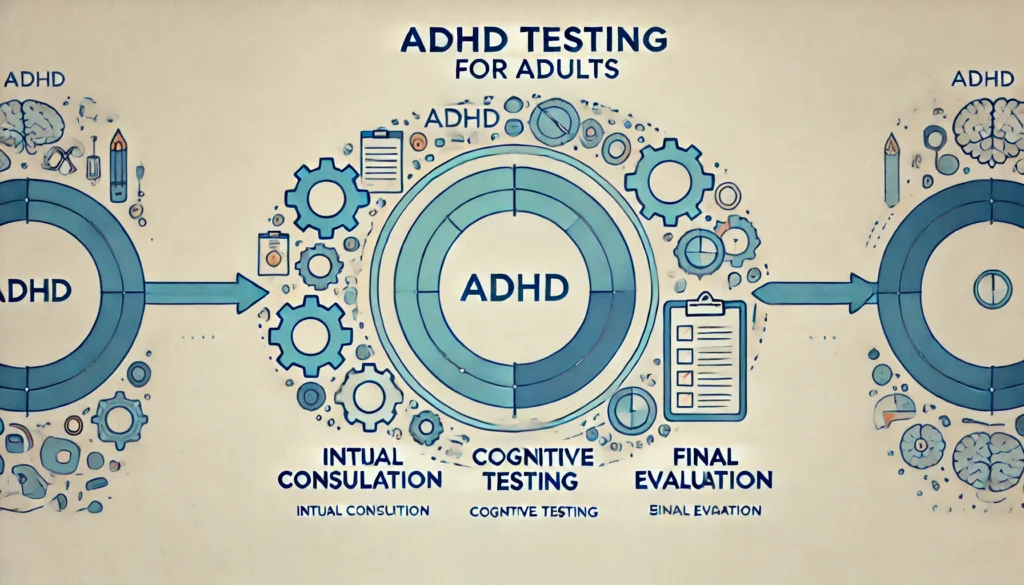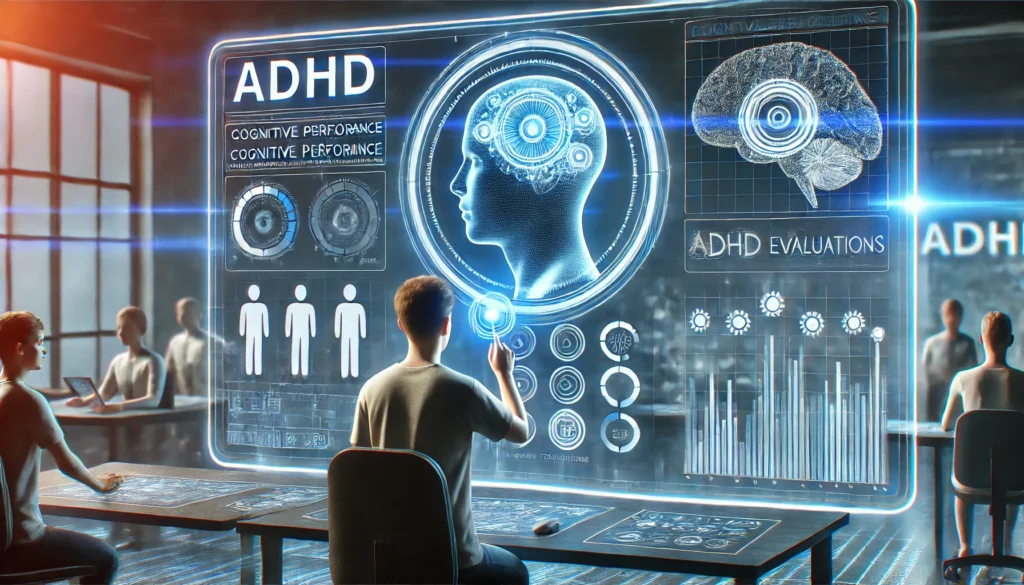ADHD is a neurodevelopmental disorder characterized by inattention, hyperactivity, and impulsivity. While it is often diagnosed in children, it is not uncommon for symptoms to persist into adulthood or for adults to seek a diagnosis later in life. The manifestation of ADHD in adults can differ significantly from that in children, often presenting as difficulties with time management, organization, and emotional regulation.
You may also like: Enhancing Concentration: Strategies for ADHD
Symptoms and Manifestations
In adults, ADHD symptoms might be less about hyperactivity and more about chronic disorganization, forgetfulness, and difficulties in sustaining attention in tasks or conversations. Adults may find themselves frequently losing items like keys or missing deadlines at work, leading to professional and personal frustrations. Emotional dysregulation, such as irritability or mood swings, can also be prominent, impacting relationships and self-esteem.
Impact on Daily Life
The effects of ADHD in adults extend beyond the workplace. Managing household responsibilities, maintaining relationships, and even engaging in leisure activities can become challenging. Social interactions might be strained due to impulsive speech or difficulty following conversations. This can lead to feelings of isolation or a lack of fulfillment, underscoring the importance of seeking a diagnosis and treatment.
Late Diagnosis and Its Implications
Many adults remain undiagnosed, attributing their struggles to personal failings rather than a medical condition. A late diagnosis can bring relief and a new perspective on past challenges. Understanding ADHD’s role in one’s life allows for the exploration of effective coping strategies, fostering a sense of empowerment and control.
The Importance of Diagnosis
Obtaining a formal diagnosis can be life-changing. For many adults, it validates their struggles and opens doors to effective management strategies and treatments. However, the testing process is not as straightforward as one might hope, and understanding the nuances is the first step toward demystifying the experience.
Validation and Understanding
A diagnosis offers validation, helping individuals understand that their challenges are not due to laziness or lack of effort. This newfound understanding can alleviate feelings of guilt or shame, replacing them with a sense of clarity and purpose. It provides a framework for interpreting past experiences and planning future actions.
Access to Resources
A formal diagnosis often grants access to resources that were previously unavailable. This includes medication, therapy, and support groups, which can significantly improve quality of life. Workplace accommodations and academic adjustments may also become accessible, reducing barriers to success.
Tailored Treatment Plans
With a diagnosis in hand, healthcare providers can develop personalized treatment plans that address the unique needs of the individual. These plans might combine medication, cognitive-behavioral therapy, and lifestyle changes to manage symptoms effectively. Tailored strategies ensure that interventions are relevant and sustainable.

What is ADHD Testing Like for Adults?
Initial Assessment and Consultation
The first step in the ADHD testing process typically involves an initial assessment with a healthcare professional, such as a psychologist or psychiatrist. During this consultation, the clinician will gather a comprehensive history of the individual’s symptoms, lifestyle, and any previous medical or psychological evaluations. This initial assessment is crucial in determining whether further testing is warranted.
Gathering Comprehensive Histories
Clinicians will delve into the individual’s personal, educational, and occupational history to identify patterns indicative of ADHD. This detailed exploration helps differentiate ADHD from other mental health conditions. Understanding the individual’s life context provides valuable insights into how symptoms manifest and impact daily functioning.
Symptom Tracking and Self-Reports
Patients may be asked to keep a symptom diary or complete self-report questionnaires detailing their daily experiences. These tools help clinicians gauge the frequency and severity of symptoms over time. Self-reports can also highlight specific areas of concern, guiding the focus of subsequent evaluations.
The Role of Family and Friends
Input from family members or close friends can be invaluable during the assessment process. These individuals offer external perspectives on the individual’s behavior, providing a more rounded view of the symptoms. Their observations can corroborate self-reported data, enhancing the accuracy of the diagnosis.
Diagnostic Tests and Evaluations
ADHD testing for adults often involves a battery of assessments, including standardized behavior rating scales, cognitive tests, and sometimes interviews with family members or partners. These evaluations aim to rule out other conditions that may mimic ADHD symptoms, such as anxiety, depression, or learning disabilities.
Behavioral Rating Scales
Standardized scales, such as the Adult ADHD Self-Report Scale (ASRS), help quantify symptoms and compare them against established benchmarks. These scales are often used alongside clinical interviews to provide a comprehensive picture of the individual’s symptom profile. The results can guide the clinician in determining the necessity of further testing.
Cognitive and Neuropsychological Testing
Cognitive tests assess areas such as attention span, working memory, and executive function, which are often impaired in ADHD. Neuropsychological evaluations may also be conducted to rule out other cognitive disorders. These tests help distinguish ADHD from other conditions, ensuring an accurate diagnosis.
Interviews and Observational Assessments
Clinicians may conduct interviews with partners or family members to gather additional insights. Observational assessments might be employed to see how symptoms manifest in real-world settings. These methods provide qualitative data, enriching the overall diagnostic process.
How Long Does ADHD Testing Take for Adults?
The duration of ADHD testing can vary significantly depending on several factors, including the individual’s history, the complexity of their symptoms, and the specific testing protocols used by the healthcare provider. Generally, the process can take anywhere from a few hours to several weeks, particularly if multiple appointments are required for comprehensive testing.
Factors Influencing Duration
The complexity of symptoms and the presence of co-occurring disorders can extend the testing process. Individuals with a complicated medical or psychological history may require more in-depth evaluations. Additionally, the availability of specialized providers can influence the timeline, especially in areas with limited resources.
Streamlining the Testing Process
To expedite the process, individuals can prepare by gathering relevant medical records and completing preliminary questionnaires beforehand. Some clinics offer streamlined services or intensive assessment sessions to reduce wait times. Exploring providers who specialize in adult ADHD can also lead to a more efficient diagnostic experience.
Managing Expectations
Understanding that the process might take time can alleviate frustration. Setting realistic expectations about the timeline and potential outcomes helps manage anxiety. Patients are encouraged to maintain open communication with their healthcare providers, seeking updates and clarification as needed.
What Does an ADHD Test Look Like for Adults?
Behavioral Assessments
Behavioral assessments are a core component of ADHD testing, involving questionnaires and rating scales that evaluate the frequency and severity of ADHD symptoms. These tools help clinicians understand the impact of symptoms on daily functioning and are often completed by both the individual and someone who knows them well, providing a holistic view of the individual’s behavior across different settings.
Questionnaires and Self-Assessment Tools
These tools allow individuals to reflect on their symptoms and their impact on daily life. Questionnaires often cover various domains, such as work, home, and social interactions, to provide a comprehensive assessment. Self-assessments empower individuals to actively participate in the diagnostic process, offering their personal insights and perspectives.
Cross-Referencing Perspectives
Involving someone who knows the individual well, such as a partner or family member, offers an external viewpoint. This cross-referencing helps identify discrepancies or confirm patterns of behavior. It enhances the reliability of the assessment, ensuring a more accurate diagnosis.
Evaluating Functional Impairments
Beyond identifying symptoms, behavioral assessments focus on how these symptoms affect daily functioning. This includes exploring impacts on professional performance, interpersonal relationships, and personal well-being. Understanding these impairments is crucial for developing effective management strategies.
Cognitive Testing
Cognitive testing involves tasks that measure attention, memory, executive function, and processing speed. These tests help identify cognitive patterns associated with ADHD and distinguish them from other neuropsychological conditions.
Attention and Concentration Tasks
These tasks assess the individual’s ability to focus, sustain attention, and shift attention between tasks. Deficits in these areas are common in ADHD, providing key diagnostic indicators. Results can guide treatment plans, highlighting areas for targeted interventions.
Memory and Learning Assessments
Memory tests evaluate both short-term and long-term memory capabilities, which can be affected by ADHD. These assessments help determine how well individuals retain and recall information. Understanding memory patterns assists in crafting strategies to enhance learning and productivity.
Executive Function Evaluations
Executive function tasks examine skills such as planning, organization, and impulse control. Deficiencies in these areas are often linked to ADHD, affecting decision-making and goal-directed behavior. Identifying executive function deficits informs therapeutic approaches, such as cognitive-behavioral therapy.
Clinical Interviews
In-depth clinical interviews provide qualitative insights into the individual’s experiences and challenges. Clinicians use these interviews to gather nuanced information about how symptoms manifest in various aspects of the individual’s life, such as work, relationships, and personal endeavors.
Exploring Personal Narratives
Interviews allow individuals to share their personal stories, offering context to their symptoms. This narrative approach helps clinicians understand the unique challenges faced by each individual. Personal anecdotes can reveal patterns and triggers, guiding the diagnostic process.
Identifying Coping Mechanisms
Clinicians explore the coping strategies individuals have developed over time. Understanding these mechanisms provides insights into how symptoms have been managed and where additional support might be needed. This information is crucial for developing tailored intervention plans.
Addressing Emotional and Social Concerns
Interviews provide a platform to discuss emotional and social difficulties, such as anxiety or relationship issues. These concerns are often intertwined with ADHD symptoms, necessitating a holistic approach to diagnosis and treatment. Addressing these aspects can significantly enhance quality of life.

Streamlining the ADHD Testing Process: Challenges and Solutions
Reducing Wait Times
A significant challenge in ADHD testing for adults is the often lengthy wait times for appointments and test results. To streamline the process, it’s beneficial to seek providers who specialize in adult ADHD and offer comprehensive evaluation services. Some clinics also provide telehealth options, which can expedite the process and reduce logistical barriers.
Telehealth and Remote Assessments
Telehealth services offer a flexible and accessible option for ADHD assessments. Remote consultations can reduce travel time and allow for more frequent follow-ups. This approach is particularly beneficial for individuals in rural or underserved areas.
Specialized ADHD Clinics
Seeking out clinics that focus specifically on ADHD can lead to more efficient and knowledgeable care. These providers often have streamlined processes and are up-to-date with the latest diagnostic tools and techniques. Specialized clinics may also offer group assessments, reducing individual wait times.
Efficient Scheduling Practices
Clinics can implement efficient scheduling practices, such as prioritizing urgent cases or offering evening and weekend appointments. Flexibility in scheduling can accommodate individuals with demanding work or family commitments. Efficient practices contribute to a smoother and more patient-centered experience.
Enhancing Accessibility
Accessibility to testing services is another challenge, particularly in areas with limited mental health resources. Exploring virtual testing options and seeking referrals from primary care providers can be effective strategies to overcome these hurdles.
Expanding Virtual Testing Options
Virtual testing platforms can expand access to assessments, especially in remote or underserved locations. These platforms offer standardized tests and assessments that can be completed from home. Virtual options increase accessibility, allowing more individuals to seek help.
Building a Supportive Network
Primary care providers can play a pivotal role in facilitating access to ADHD testing. They can provide referrals to specialists and offer initial screenings. Building a network of supportive healthcare professionals enhances access and continuity of care.
Community Outreach and Education
Community outreach programs can raise awareness about ADHD and available testing services. Educational initiatives can reduce stigma and encourage individuals to seek help. Outreach efforts contribute to a more informed and supportive community.

Future Implications and Trends in ADHD Testing
The landscape of ADHD testing is evolving, with emerging technologies and methodologies poised to enhance the accuracy and efficiency of diagnoses. Innovations such as digital phenotyping and neuroimaging are being explored to provide more objective measures of ADHD symptoms, potentially transforming the testing process in the future.
The Role of Technology
Digital platforms and applications are increasingly being integrated into the ADHD assessment process, offering real-time data collection and analysis. These tools can provide valuable insights into symptom patterns and treatment responses, ultimately contributing to more personalized and effective management plans.
Digital Phenotyping and Wearable Technology
Digital phenotyping involves using data from smartphones and wearable devices to assess behavioral patterns. These technologies can track activity levels, sleep patterns, and communication habits. Wearable devices offer continuous monitoring, providing a wealth of data for more accurate assessments.
Neuroimaging and Biomarkers
Advances in neuroimaging are exploring the use of brain scans to identify structural or functional markers of ADHD. Biomarkers may offer objective diagnostic criteria, reducing reliance on subjective assessments. Neuroimaging technologies hold the potential to revolutionize ADHD diagnosis.
Artificial Intelligence and Machine Learning
AI and machine learning algorithms are being developed to analyze complex data sets from assessments. These technologies can identify patterns and predict outcomes, aiding clinicians in diagnosis and treatment planning. AI-driven tools promise to enhance the precision and efficiency of ADHD evaluations.
Implications for Treatment
As our understanding of ADHD in adults continues to grow, so too does the range of treatment options available. A comprehensive diagnosis not only guides medication choices but also informs behavioral therapies and lifestyle interventions that can significantly improve quality of life.
Personalized Medication Plans
Advancements in pharmacogenomics are allowing for more personalized medication plans. Understanding genetic factors can inform drug choice and dosage, enhancing treatment efficacy. Personalized plans reduce trial-and-error approaches, improving patient outcomes.
Integrating Behavioral Therapies
Behavioral therapies, such as cognitive-behavioral therapy and mindfulness practices, are integral to comprehensive treatment. These therapies address emotional regulation, stress management, and organizational skills. Integrating these approaches offers holistic support for individuals with ADHD.
Lifestyle and Wellness Interventions
Lifestyle changes, including diet, exercise, and sleep hygiene, play a crucial role in managing ADHD symptoms. Wellness interventions can enhance overall health and reduce symptom severity. Encouraging healthy habits supports long-term well-being and quality of life.
Conclusion
Navigating the ADHD testing process as an adult can be daunting, but understanding what to expect can alleviate some of the anxiety and uncertainty. By demystifying the steps involved and exploring the latest advancements in testing methodologies, we can empower individuals to seek the help they need and embark on a path toward better mental health and well-being. ADHD is a manageable condition, and with the right support and strategies, adults can lead fulfilling and productive lives.
In closing, remember that a thorough evaluation and diagnosis are the first steps toward understanding and managing ADHD. Armed with knowledge and guidance, you can take proactive steps to address the challenges and embrace the opportunities that come with a clearer understanding of your cognitive landscape. Seeking help is a courageous step, and with the right resources, individuals can unlock their full potential and thrive in all aspects of life.
Further Reading:
ADHD Screening or Assessment: Right for You?
How Long Is the Psychological Assessment for ADHD in Adults?
Important Note: The information contained in this article is for general informational purposes only, and should not be construed as health or medical advice, nor is it intended to diagnose, prevent, treat, or cure any disease or health condition. Before embarking on any diet, fitness regimen, or program of nutritional supplementation, it is advisable to consult your healthcare professional in order to determine its safety and probable efficacy in terms of your individual state of health.
Regarding Nutritional Supplements Or Other Non-Prescription Health Products: If any nutritional supplements or other non-prescription health products are mentioned in the foregoing article, any claims or statements made about them have not been evaluated by the U.S. Food and Drug Administration, and such nutritional supplements or other health products are not intended to diagnose, treat, cure, or prevent any disease.


